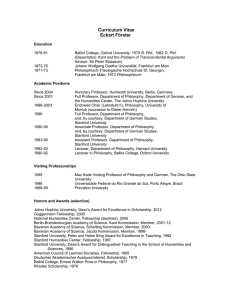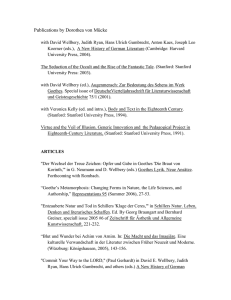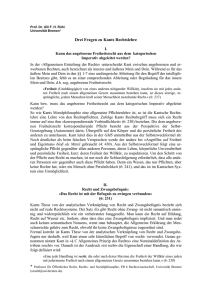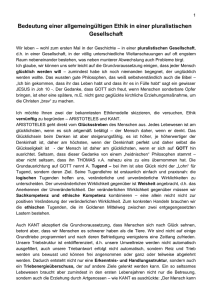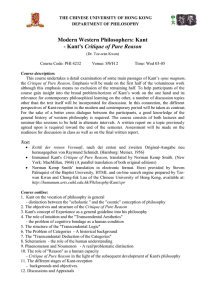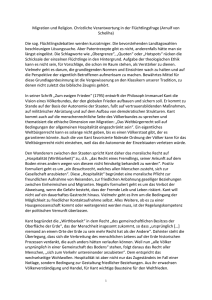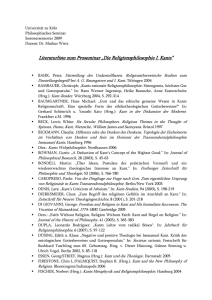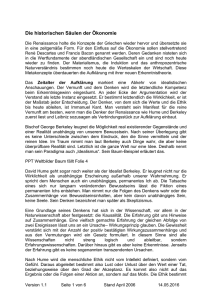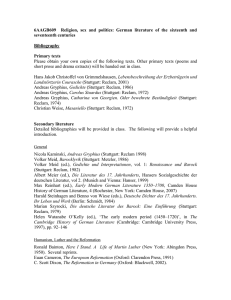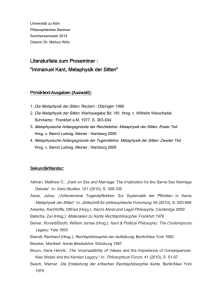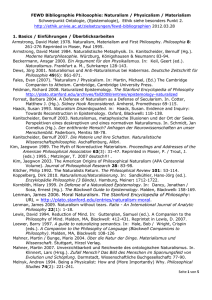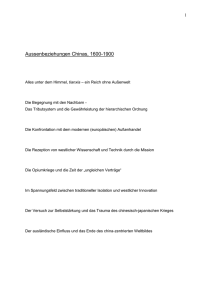Curriculum Vitae Eckart Förster Education 1976
Werbung
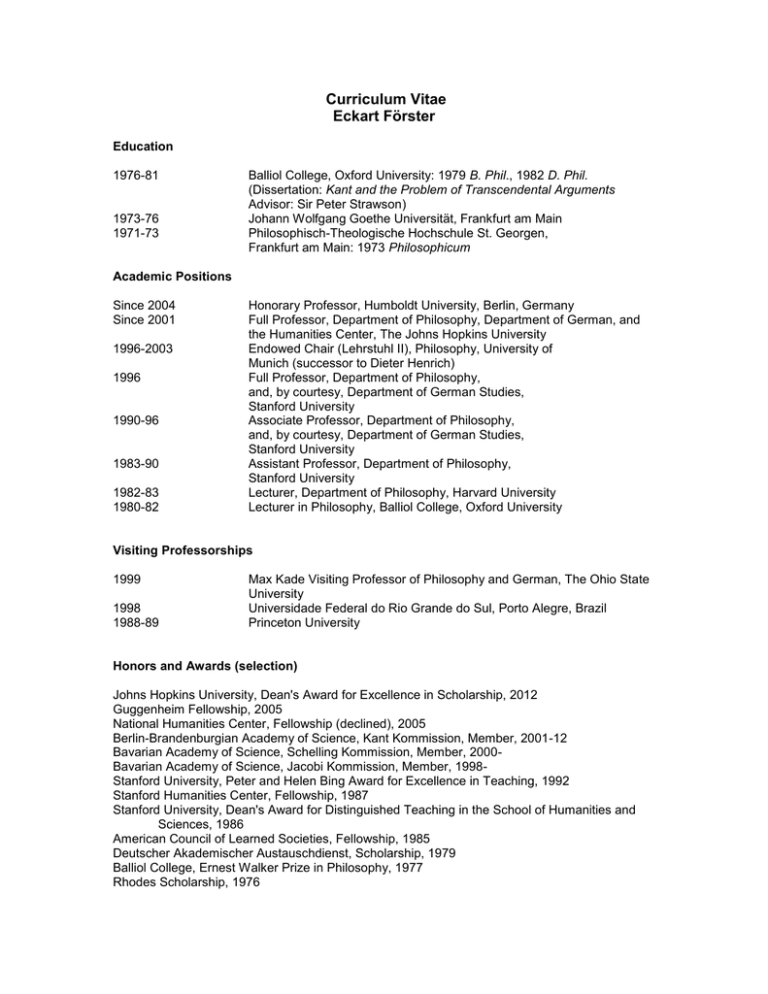
Curriculum Vitae Eckart Förster Education 1976-81 1973-76 1971-73 Balliol College, Oxford University: 1979 B. Phil., 1982 D. Phil. (Dissertation: Kant and the Problem of Transcendental Arguments Advisor: Sir Peter Strawson) Johann Wolfgang Goethe Universität, Frankfurt am Main Philosophisch-Theologische Hochschule St. Georgen, Frankfurt am Main: 1973 Philosophicum Academic Positions Since 2004 Since 2001 1996-2003 1996 1990-96 1983-90 1982-83 1980-82 Honorary Professor, Humboldt University, Berlin, Germany Full Professor, Department of Philosophy, Department of German, and the Humanities Center, The Johns Hopkins University Endowed Chair (Lehrstuhl II), Philosophy, University of Munich (successor to Dieter Henrich) Full Professor, Department of Philosophy, and, by courtesy, Department of German Studies, Stanford University Associate Professor, Department of Philosophy, and, by courtesy, Department of German Studies, Stanford University Assistant Professor, Department of Philosophy, Stanford University Lecturer, Department of Philosophy, Harvard University Lecturer in Philosophy, Balliol College, Oxford University Visiting Professorships 1999 1998 1988-89 Max Kade Visiting Professor of Philosophy and German, The Ohio State University Universidade Federal do Rio Grande do Sul, Porto Alegre, Brazil Princeton University Honors and Awards (selection) Johns Hopkins University, Dean's Award for Excellence in Scholarship, 2012 Guggenheim Fellowship, 2005 National Humanities Center, Fellowship (declined), 2005 Berlin-Brandenburgian Academy of Science, Kant Kommission, Member, 2001-12 Bavarian Academy of Science, Schelling Kommission, Member, 2000Bavarian Academy of Science, Jacobi Kommission, Member, 1998Stanford University, Peter and Helen Bing Award for Excellence in Teaching, 1992 Stanford Humanities Center, Fellowship, 1987 Stanford University, Dean's Award for Distinguished Teaching in the School of Humanities and Sciences, 1986 American Council of Learned Societies, Fellowship, 1985 Deutscher Akademischer Austauschdienst, Scholarship, 1979 Balliol College, Ernest Walker Prize in Philosophy, 1977 Rhodes Scholarship, 1976 Publications of Eckart Förster Books The Twenty-Five Years of Philosophy. Cambridge, Mass.: Harvard University Press, 2012. Die 25 Jahre der Philosophie. Frankfurt am Main: Vittorio Klostermann, 2011 (2nd. ed. 2012). This book is the subject matter of Übergänge – diskursiv oder intuitiv? Essays zu Eckart Försters „Die 25 Jahre der Philosophie“, eds. Johannes Haag and Markus Wild. Frankfurt am Main: Klostermann 2013. (Essays by K. Ameriks, D. Breazeale, D. Emundts, J. Haag, G. Hindrichs, R.-P. Horstmann, Y. Melamed, T. Pinkard, T. Rosefeldt, M. Rosen, U. Schlösser, E. Watkins, D. Wellbery, M. Wild). Kant's Final Synthesis. Cambridge, Mass.: Harvard University Press, 2000. Kant's Opus postumum. Edited and translated (with Michael Rosen), with a critical Introduction and Commentary. Cambridge: Cambridge University Press, 1993. Editor, The Course of Remembrance and Other Essays on Hölderlin, by Dieter Henrich. Stanford: Stanford University Press, 1997. Editor, Kant's Transcendental Deductions. The Three Critiques and the Opus postumum. Stanford: Stanford University Press, 1989. Co-Editor (with Yitzhak Y. Melamed), Spinoza and German Idealism. Cambridge/New York: Cambridge University Press, 2012. Articles "Gadamer." In The Fontana Biographical Companion to Modern Thought, ed. A. Bullock and R. W. Woodings. London: Fontana, 1983, 257. "Kant's Refutation of Idealism." In Philosophy, Its History and Historiography, ed. A. J. Holland. Dordrecht: D. Reidel Publishing Company, 1985, 287-303. "Is There 'a Gap' in Kant's Critical System?" Journal of the History of Philosophy XXV, 4 (1987), 533-555. Reprinted in German Idealism: Critical Concepts in Philosophy, ed. Klaus Brinkmann. London/New York: Routledge, 2007. "Kästner und die Philosophie. Zu Kants Kästnerkritik im Opus postumum." Kant-Studien 79 (1988), 342-347. "Kants Metaphysikbegriff: vor-kritisch, kritisch, nach-kritisch." In Metaphysik nach Kant?, ed. Dieter Henrich and Rolf-P. Horstmann. Stuttgart: Klett-Cotta, 1988, 123-136. "How Are Transcendental Arguments Possible?" In Reading Kant, ed. E. Schaper and W. Vossenkuhl. Oxford: Blackwell, 1989, 3-20. "Preface." In Kant's Transcendental Deductions. The Three Critiques and the Opus postumum, ed. Eckart Förster. Stanford: Stanford University Press, 1989, vii-x. "Kant's Selbstsetzungslehre." In Kant's Transcendental Deductions. The Three Critiques and the Opus postumum, ed. Eckart Förster. Stanford: Stanford University Press, 1989, 217-238. "Kant's Notion of Philosophy." The Monist 72,2 (1989), 285-304. "Fichte, Beck and Schelling in Kant's Opus postumum." In Kant and His Influence, ed. George MacDonald Ross and Tony McWalter. Bristol: Thoemmes, 1990, 2nd edition New York: Continuum, 2005, 146-169. "Die Idee des Übergangs. Überlegungen zum Elementarsystem der bewegenden Kräfte." In Übergang. Untersuchungen zum Spätwerk Immanuel Kants, ed. Forum für Philosophie Bad Homburg. Frankfurt am Main: Klostermann, 1991, 28-48. "'Was darf ich hoffen?' Zum Problem der Vereinbarkeit von theoretischer und praktischer Vernunft bei Immanuel Kant." Zeitschrift für philosophische Forschung 46,2 (1992), 169-186. "Kant's Third Critique and the Opus postumum." Graduate Faculty Philosophy Journal 16,2 (1993), 345-358. "'To lend wings to physics once again.' Hölderlin and the 'Oldest System-Programme of German Idealism'." European Journal of Philosophy 3,2 (1995), 174-198. "Ich betrachte die Vernunft, als den Anfang des Verstandes." In Trascendenza, Trascendentale, Esperienza. Studi in onore di Vittorio Mathieu, ed. G. Derossi, M. M. Olivetti, A. Poma, G. Riconda. Padova: Cedam, 1995, 299-316. "Jacob Sigismund Beck." In The Routledge Encyclopedia of Philosophy, ed. Edward Craig. London: Routledge, 1998, vol. 1, 687-689. "Foreword." In The Course of Remembrance and Other Essays on Hölderlin, by Dieter Henrich. Stanford: Stanford University Press, 1997,1-10. ”‘Da geht der Mann dem wir alles verdanken!’ Eine Untersuchung zum Verhältnis Goethe/Fichte.” Deutsche Zeitschrift für Philosophie 45,3 (1997), 1-14. Portuguese translation: ”Aí vai o homem a quem nós devemos tudo! Uma investigação da relação Goethe-Fichte.” Filosofia Politica (1998), 143-160. "Fichte and the German Literary Culture of His Time." In The Cambridge Companion to Fichte, ed. Günther Zöller. Cambridge: Cambridge University Press. Forthcoming. "Die beiden Vorreden der KrV.” In Kooperativer Kommentar zu Kants Kritik der reinen Vernunft, eds. G. Mohr and M. Willaschek. Berlin: Akademie-Verlag, 1998, 37-55. ”Die Wandlungen in Kants Gotteslehre.” Zeitschrift für philosophische Forschung 52,3 (1998), 341-362. Portuguese translation: ”As mundanças no conceito kantiano de Deus.” Studia Kantiana (1999) Extended version under the title „Das All der Wesen.“ In Architektonik und System in der Philosophie Kants, eds. H. F. Fulda and J. Stolzenberg. Hamburg: Felix Meiner Verlag, 2001, 106-127. "Fichte und der Atheismusstreit von 1799." In Welt ohne Gott? Theoretischer und praktischer Atheismus, ed. Venanz Schubert. St. Ottilien: Eos Verlag, 1999, 65-84. Hölderlin." In Metzler Lexikon Religiöser Denker. Stuttgart/Weimar: J. B. Metzler, 2000, 342-344. ”Kants Materietheorie im Lichte der Kritik Schellings.” In Idealismus als Theorie der Representation?, eds. Ralph Schumacher and Oliver Scholz. Paderborn: Mentis, 2001, 97-117. "Kants philosophische Konstruktion." In Kant und die Berliner Aufklärung. Akten des IX. Internationalen Kant-Kongresses, eds. Volker Gerhard, Rolf-Peter Horstmann, Ralph Schumacher. Berlin: de Gruyter, 2001, 172-184. "Strawson on Aesthetic Judgment in Kant." In Strawson and Kant, ed. H.-J. Glock. Oxford: Clarendon Press, 2003, 185-204. German: "Kant und Strawson über ästhetische Urteile." In Kant in der Gegenwart, ed. Jürgen Stolzenberg. Berlin/New York: Walter de Gruyter, 2007, 269-289. Portuguese translation: in Analytica (Rio de Janeiro) 13.1 (2009), 13-38. "A New Program for the Aesthetic Education of Mankind? The Oldest System Program of German Idealism." In The New History of German Literature, eds. David Wellbery et. al. Cambridge: Harvard University Press, 2004, 470-475. "Goethe on 'Das Auge des Geistes'." Deutsche Vierteljahrsschrift für Literaturwissenschaft und Geistesgeschichte 75 (2001), 87-101. “O vivente na filosophia e na poesia.“ Filosofia Politica 3,1 (2001), 45-56. "Dialektik: Erstes und Zweites Hauptstück." In Kooperativer Kommentar zu Kants Kritik der praktischen Vernunft, ed. Ottfried Höffe. Berlin: Akademie-Verlag, 2002, 173-186. English translation in K. Ameriks and O. Höffe (eds.), Kant's Moral and Legal Philosophy. New York: Cambridge University Press, 2009, 198-212. "Die Bedeutung von §§ 76, 77 der Kritik der Urteilskraft für die Entwicklung der nachkantischen Philosophie (Teil 1).“ Zeitschrift für philosophische Forschung 56,2 (2002), 169-190. Chinese translation, 2005. English translation in Graduate Faculty Philosophy Journal 30,2 (2009), 1-21. "Die Bedeutung von §§ 76, 77 der Kritik der Urteilskraft für die Entwicklung der nachkantischen Philosophie (Teil 2)“, Zeitschrift für philosophische Forschung 56,3 (2002), 322-345. Reprinted under the title "Hegel in Jena". In Das Interesse des Denkens. Hegel aus heutiger Sicht, eds. Wolfgang Welsch and Klaus Vieweg. Munich: Wilhelm Fink Verlag, 2004, 109-129. Chinese translation, 2005. English translation in Graduate Faculty Philosophy Journal 31.2 (2010), 323-347. "Reply to Friedman and Guyer.” Inquiry 46,2 (2003), 228-238. “Zwei neuaufgefundene lose Blätter zu Kants Opus postumum.“ Kant-Studien 95 (2004), 1-8. "'Behutsamkeit, Indirektheit, Unmerklichkeit, auch oft >Antitechniken< sind meine Möglichkeiten': Zu Joseph Beuys: Das Ende des 20. Jahrhunderts". In Joseph Beuys "Das Ende des 20 Jahrhunderts", eds. S. Willisch und B. Heimberg. München: Schirmer/Mosel, 2007, 49-81. (with Susanne Willisch), "Die Idee geht verloren." In Joseph Beuys "Das Ende des 20 Jahrhunderts", eds. S. Willisch und B. Heimberg. München: Schirmer/Mose,l 2007, 249-282. "Der deutsche Idealismus aus der Sicht der USA". Jahrbuch der Japanischen Hegel-Gesellschaft 13 (2007), 115-123. "Goethe als Philosoph". In Die Drei 78:6 (2008), 9-19. "Hegels 'Entdeckungsreisen'". In Hegel's Phänomenologie des Geistes, eds. Klaus Vieweg und Wolfgang Welsch. Frankfurt am Main: Suhrkamp, 2008, 37-57. "The Hidden Plan of Nature." In Kant's "Idea for a Universal History with a Cosmopolitan Aim", eds. Amélie Oksenberg Rorty and James Schmidt. Cambridge: Cambridge University Press, 2009, 187-199. "Immanuel Kant". In The History of Western Philosophy of Religion, eds. Nick Trakakis and Graham Oppy. Durham: Acumen, 2009, vol. 3, 277-288. "What is 'The Highest Point of Transcendental Philosophy'?". In Rethinking Kant, Vol. II, ed. Pablo Muchnik. Cambridge: Cambridge Scholar Publisher, 2010, 257-271. "Kant's Epistemology." In The Routledge Companion to Epistemology, eds. Sven Bernecker and Duncan Pritchard. London/New York: Routledge, 2010, 741-749. "Wir Ideenfreunde." In Natur und Geist. Über ihre evolutionäre Verhältnisbestimmung, eds. Christian Tewes und Klaus Vieweg. Berlin: Akademie Verlag, 2011, 335-349. "Transzendentalphilosophie;" "Kopernikanische Revolution;" "unum, verum, bonum;" "Transzendentalphilosophie der Alten;" "Transzendentalphilosophie, höchster Standpunkt der;" "Transzendentalphilosophie, höchster Punkt der;" "Astrologie;" "Kopernikus, Nikolaus;" "Thales von Milet;" "Kepler, Johannes;" "Pythagoras." In: Kant-Lexikon, eds. Georg Mohr, Jürgen Stolzenberg, Marcus Willaschek. Berlin: deGruyter. Forthcoming. "Perception and Antinomy." In Life and Philosophy. Essays in Honour of Alan Montefiore, eds. Catherine Audard-Montefiore et al. Oxford: FEP Publishers, 2011, 68-74. "Goethe's Spinozism." In Spinoza and German Idealism, eds. Eckart Förster and Yitzhak Y. Melamed. Cambridge/New York: Cambridge University Press, 2012, 85-99. "Grenzen der Erkenntnis?" In Self, World, and Art, ed. Dina Emundts. Berlin/New York: de Gruyter, 2012, 203-216. "Eine systematische Rekonstruktion?" In Übergänge – diskursiv oder intuitiv? Essays zu Eckart Försters „Die 25 Jahre der Philosophie“, eds. Johannes Haag and Markus Wild. Frankfurt am Main: Klostermann, 2013. Forthcoming. "“Zum Schauen bestellt‘ – Goethes Naturreligion". Goethe-Jahrbuch 130 (2013). Forthcoming.
